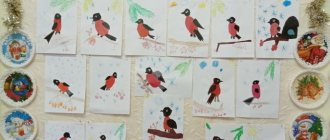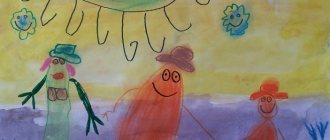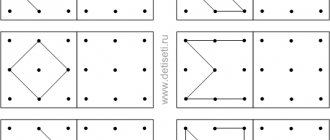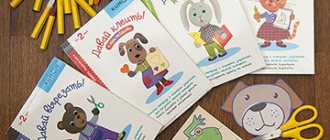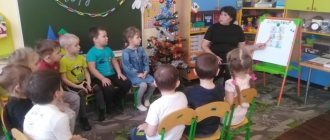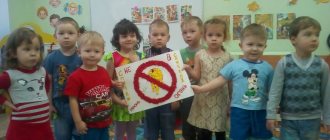Preparatory group. Senior preschool age. Children 6-7 years old
Correctional and developmental lesson of a teacher-psychologist with children of the preparatory group "New Year's serpentine" Corrective and developmental lesson of a teacher-psychologist with children of the preparatory group Topic: "New Year's serpentine"
.
Objectives: -Development of attention and voluntary behavior -Development of motor skills and coordination -Development of speech and thinking Ritual of greeting Psychologist : I am glad to see you all again...
Correctional and developmental lesson of a teacher-psychologist with children of the preparatory group “Exam at Bukvoezhka” Corrective and developmental lesson of a teacher psychologist with preparatory group children Topic: “Exam at Bukvoezhka”
.
Objectives: -Development of attention and voluntary behavior -Development of speech and thinking All together: Letter book? No one appears) Psychologist : Guys, let's call him...
MAGAZINE Preschooler.RF
Summary of a diagnostic game lesson with children of senior preschool age “Quest game “In Search of the Key”Compiled by: Teacher-psychologist Natalya Nikolaevna Vishnyakova, Nadym, 2021.
Place of work: Municipal preschool educational institution "Kindergarten "Scarlet Flower" in Nadym"
Target
- to promote the development of the imagination of preschoolers, using modern non-traditional methods and techniques, in particular, through the introduction of game quest technology into the educational process, which promotes the formation of independent thinking in children and the development of cognitive activity.
Tasks:
- encourage children to set goals and become independent in all types of activities and thinking;
- contribute to the development of auditory and visual perception, attention, memory, general and fine motor skills, the ability to navigate on a plane, search activity, and the desire for novelty;
- improve the ability to cooperate, cultivate a friendly attitude towards others;
Methods and techniques:
- practical (games “The fourth odd one” , “Draw a figure” , “Remember the object” , “Collect a picture” )
- visual (task cards, emoticons)
- verbal (questions, discussion, children's stories).
Materials and equipment: ball, plan map, set of game cards “4-odd” , cards for the exercise “remember the object” (according to the number of children), blank sheets of paper (according to the number of children), pencils, puzzle, key, emoticons.
Planned results:
- Development of cognitive functions, ability to cooperate with each other
- transfer of emotions.
Types of children's activities: gaming, communication.
Class.
Organizational Children enter the hall and greet the guests. They greet each other with the words “Good afternoon... (child’s name), I’m glad to see you .
Guys, I lost the key to my office. What do you think should be done? (Children's answers: - take a spare one; call the Ministry of Emergency Situations; find where you left it). To find the clue, we need to complete the task. We will act according to plan.
Main part
1. "Game 4 is extra".
I invite the children to take a card, they need to find an extra item and explain why it is extra.
Well done. That's right, I think this will be part of the hint for you.
After the task, we find a piece of the puzzle in the envelope.
Children look at the plan and determine where they can get the next clue.
2. Working at a desk.
Exercise “Draw a figure” .
“Be careful, draw all the shapes”.
Sit down at the table, take a pencil. Draw the figures as I say.
Draw a circle in the center of the sheet.
Draw a square in the upper left corner.
Draw a triangle in the lower left corner...
Draw a rectangle in the upper right corner.
Draw an oval in the lower right corner.
Well done, check if you did everything correctly.
(P. p. shows the correct card, children compare with the model.)
3. Exercise “Remember the subject” .
P.p. next task. It's time for you to test your child's memory.
Now I will name a few items. Listen carefully and try to remember as many words as possible: candy, butterfly, turtle, frog, watering can, elephant, snail, car. Now circle the items you remember.
Exchange leaves, take a blue pencil, and check if your friend did everything correctly. (P.p. reads the words, the children check, circle the item that was missed. They determine whether the task was completed correctly. After the task, we find the second part of the puzzle in the envelope. The children look at the plan, determine where they can get the next clue.
4. Game “Floor, nose, ceiling” .
Next task for attention. I think we should get some rest. And now it's time for you kids to play.
Stand in a cheerful circle 1, 2, 3, 4, 5 We begin to play You guys, don’t yawn And repeat after me
Do what I say, not what I show.
After the task, we find the third part of the puzzle in the envelope. Children look at the plan and determine where they can get the next clue.
5. Game “Part and Whole” .
We go up to the 3rd floor, there is a piece of the puzzle on the table.
Look, you and I have pieces of the puzzle and there are puzzles on the table, let’s put them together and see, maybe this will be a clue to where I lost my keys. I invite the children to assemble all the parts. Children collect puzzles.
The result is a picture, the children must conclude what happened (chest), where did you see such an object? (near the office).
I suggest the children find it. Children find the object and take out the key. We open the office.
6. Reflection. Conversation “My mood”
P.p. I suggest you sit in a circle. I ask the children what feelings they experienced when they helped look for the key and when they found it. (Surprise, desire to help, joy), What is your mood now?
I invite children to choose an emoticon that matches their mood.
Guys, you helped me find the key because you were friendly, completed the tasks, and did not leave me in trouble.
P.p. sums it up and asks what was difficult?
What was easy? What did you like most? Evaluates each child. Thanks for your help.
GCD duration: 25-27 minutes.
Bibliography:
- Sharokhina V.L. “Correctional and developmental classes in the senior group” - M: Knigolyub 2004.
- Kurazheva N. Yu., Baraeva N. V., Tuzasva A. S., Kozlova I. L. 3 “Seven-flowered flower” . Program for the intellectual, emotional and volitional development of children 5 - 6 years old. - St. Petersburg: Speech; M.: Sfera, 2011. - 218 p.
- Svetlanova I.A. “Psychological games for children” - Rostov-n/D: “Phoenix” , 2015.
“Remember” task
It's time for you to test your kids' memory!
Listen carefully and try to remember as many words as possible.
An adult names several objects:
candy, butterfly, turtle, frog, watering can, elephant, snail, car.
Now circle only those objects that were named.
Exercise “Draw a figure” .
“Be careful, draw all the shapes”.
Sit down at the table, take a pencil. Draw the figures as I say.
Draw a circle in the center of the sheet.
Draw a square in the upper left corner.
Draw a triangle in the lower left corner...
Draw a rectangle in the upper right corner.
Draw an oval in the lower right corner.
Well done, check if you did everything correctly.
P.p. shows the correct card, children compare with the sample
| Next > |
What does a child psychologist do?
First of all, let's figure out what a child psychologist does and what he doesn't do, and also separate a child psychologist from a psychiatrist, neurologist and teacher.
Child psychologist conducting psychological diagnostics
A child psychologist is well versed in age norms and individual characteristics of child development, therefore, with the help of special diagnostic procedures (psychological tests, observations, interviews with parents, games, etc.) he can give a detailed psychological characteristics of the child, which includes a description of the level of development of thinking and memory , attention, voluntary regulation, characteristics of personal qualities, emotional state, temperament, etc.
Such diagnostics are used to understand the causes of a child’s behavioral or emotional difficulties, to help parents decide when it is better for the child to go to school or kindergarten, to try to prevent possible difficulties associated with the beginning of education, to select suitable developmental activities or to adjust parenting methods .
Child psychologist conducting consultations for parents
A specialist in the field of child and family psychology also has training in the field of educational psychology and educational psychology, so he can help parents understand how to solve the current problem in the upbringing or condition of the child (for example, he began to cry more often, bites, draws creepy monsters, does not start talking, has trouble sleeping, is too shy, etc.), and also choose the best way to help the child survive difficult events in life (moving, having a brother or sister, parental divorce).
During the consultation with parents, the psychologist provides them with informational support, talking about the age characteristics of children, possible reasons for their behavior and ways to correct it, and also supports parents emotionally, helping them understand that there is a way out of any problem.
A child psychologist conducts developmental and corrective classes for children
Of course, a child psychologist also conducts classes for the kids themselves. The goals of these classes can be very different: from developing the child’s cognitive processes to working with complex emotional experiences and childhood traumas. Usually, parents make the decision to have their child attend classes with a psychologist after conducting a psychological diagnosis of the child and an initial consultation.
Different psychologists adhere to different methods of work, some of them have several. The psychologist always discusses the nature of activities with the child and their goals with parents, so do not worry that you will not know what your child is doing with the psychologist.
A child psychologist works with healthy children and their parents, helping them overcome life's difficulties, conducting diagnostics, consultations for parents and developmental activities for children.
What doesn't a child psychologist do?
Diagnostics, consultations and correctional and developmental activities are the three main areas of a psychologist’s work. The rest directly follow from them: drawing up recommendations and conclusions, developing educational materials, conducting trainings for parents, etc. The range of tasks is wide, but there is still a clear list of things that a psychologist will never do:
- The psychologist does not make diagnoses or prescribe medications
Only a doctor (in our case, a psychiatrist or neurologist) can make any diagnosis and prescribe medications based on it; an ordinary psychologist can only work with healthy or mildly disabled children. It is worth remembering that a psychologist can recommend visiting other specialists if he suspects some kind of disorder in a child, and following these recommendations and informing the psychologist about the results will greatly increase the effectiveness of his work and the speed of achieving the goal you need.
- The psychologist does not make decisions for parents
Is it possible for a child to go to school? Should you tell your child about his grandfather's death? How to prepare children for an addition to the family? Psychologists will be happy to advise parents on these and many other issues, help analyze the pros and cons of each scenario, give their recommendations, but will never insist on any single outcome, so the final decision always remains with the parents themselves.
- The psychologist does not evaluate the actions of parents and never condemns them
Many mothers and fathers are afraid that during the consultation they may feel like schoolchildren who are being scolded by a strict teacher. In fact, the task of a psychologist is to help you cope with difficulties and find the best way for yourself to solve the problem. That is why the psychologist is always on your side.
If you feel that you are raising your child incorrectly, a child psychologist can help you understand the reasons for your thoughts and behavior and find ways to change them. If you feel insecure or afraid, a psychologist will provide you with emotional support and help you find a way out of the situation. Under any circumstances, the psychologist observes the principle of respect for the client.
- The psychologist does not disclose the information received to anyone.
Every psychologist is obliged to keep everything that happens and is discussed during the consultation secret from any strangers and even other family members. Be sure that if you shared something with a psychologist, he will not tell either the child’s teachers or your husband about it, will not write about it on Instagram for you, and, moreover, will not inform the school or kindergarten. If a child tells something important to a psychologist, he partially discloses this information only to his parents and to the extent necessary to achieve his goals.
A psychologist can give recommendations to a child’s teachers, but never reveals family secrets. So, for example, if a child has had negative experiences with peers, the psychologist may recommend that the teacher pay special attention to the child’s interaction with other children in the group, but will not tell the details of the traumatic events.
- A psychologist does not undertake to work with a client if he does not feel confident in his knowledge of a specific problem.
Child psychologists specialize in different problems and use different methods of work. This means that sometimes the psychologist is not ready to take on the client’s problem. In such cases, he usually recommends contacting colleagues who specialize in this issue. This behavior indicates a responsible approach of the specialist and a sincere desire to help his client.
A professional psychologist is a person with appropriate education and work experience who always acts for the benefit of the client, allowing children and their parents to more easily overcome age-related crises and life’s adversities.
Psychologist Marina Zhukova tells what happens in the child psychologist’s office:
Junior group. Early childhood, nursery. Children 1-4 years old
Summary of a complex lesson with elements of psychological training for children 1.5–2 years old “Feelings are more important than words” MDOU “Kindergarten No. 157”
Summary of a complex lesson with elements of psychological training for children 1.5–2 years old. “Feelings are more important than words”
Prepared by: teacher-
psychologist Mikhailova A.L. Yaroslavl 2021 “Feelings are more important than words”
Equipment. Boxes Masha and the Bear, hoop, ribbons,…
Emotional perception of beauty by young children in music classes Emotional perception of beauty by young children in music classes Early childhood is a period of intense physical and mental development . At this stage, fundamental human abilities are laid. The period of early childhood is unique and...
What is the difference between a psychologist and a teacher, neurologist and psychiatrist?
You should be well aware of the differences between a psychologist and a teacher, neurologist and psychiatrist.
A neurologist and a psychiatrist are people with higher medical education who have a specialized license for medical practice; they have the right to prescribe medications and prescribe treatment.
A neurologist deals with disorders in the functioning of the nervous system: headaches, constant fatigue, tics, back pain, head injuries, fainting, coordination and balance disorders, sleep disorders, in some cases sensory organ disorders, and more.
A psychiatrist deals with mental disorders: personality disorders (for example, attacks of uncontrolled aggression), mood disorders (depression and impaired motivation, sudden mood swings, etc.), disorders of cognitive functions (impaired perception, for example, hallucinations, thinking, memory, etc. etc.), painful personality changes after traumatic life events (sleep problems, aggressiveness, isolation, etc.). The task of doctors is timely diagnosis and assistance in eliminating or alleviating the symptoms of the disease and improving the patient’s quality of life.
A teacher is engaged in teaching and raising children. He has a pedagogical education and is responsible for the knowledge and skills of children, as well as their ability to comply with accepted standards of behavior. The teacher evaluates the child’s knowledge and skills and their compliance with age norms, studies how the child acquires new knowledge and retains the material covered in his memory. Developmental classes with a teacher allow the child to learn new things and also help improve the child’s learning ability.
A psychologist is a specialist with a psychological education, whose task is to take care of the psychological well-being of the client. It helps people fight negative thoughts and reactions, strengthen self-esteem, improve communication skills with other people, develop the cognitive sphere, overcome life crises and difficult periods, resolve family conflicts and much more. All psychologists have different additional education and areas of professional interest: some work with marital relationships, others provide career counseling, others help improve parent-child relationships and promote the harmonious development of the child, and others specialize in working with traumatic events and their consequences.
Specialists from different fields usually tend to work together: this gives better and faster results. Therefore, it is not surprising that one specialist will recommend seeking advice from another. So, for example, it is completely normal if a psychologist recommends seeing a psychiatrist or neurologist, and a teacher gives a recommendation to visit a psychologist. Remember that all specialists are solely interested in getting rid of the problem as quickly as possible, so their recommendations should be followed.
Quest game “Journey to the Land of Feelings”
Abstract of an open lesson in sub.gr
"Journey to the Land of Feelings."
educational psychologist Totmyanina M.S.
Goals
: the formation of adequate emotional states and manifestations in contacts with the outside world.
Tasks:
1. Teach children to analyze their internal state and the state of other people.
2. Develop empathy, desire and willingness to help other people.
3. To develop in children the skills of cooperation and cultural communication.
4. To develop the skills of voluntary movements through psycho-gymnastics.
Preliminary work:
- classes to familiarize yourself with various feelings and their significance in the life of every person;
- consideration of situations related to the expression of various feelings;
— games and exercises for emotional and personal development;
- familiarization with the ways in which you can express emotions (facial expressions, pantomime, to music, using color).
Materials:
a ball of thread, “a letter from the king”, a map - diagram of the Land of Feelings, a table, circles-plates of different colors, toothpaste, wet wipes, a chest, a gate, keys, a “wall”, portraits of children expressing different feelings, layouts of traces of feelings, cut portrait of the king, sheets of colored paper, audio recording.
The lesson is aimed at the formation of an age-related mental new formation - personal self-awareness, including awareness of one’s own personal qualities and abilities.
Progress of the lesson.
Psychologist:
“Guys, I suggest you sit in a circle. And as always, we start our lesson with the game “I Like You.” Now we will all together form one big colored web that connects us to each other. When we weave it, each of us can express our kind thoughts and feelings that we feel towards our peers. So, wrap the loose ends of the woolen thread twice around your palm and roll the ball towards one of the guys, accompanying your movement with the words: “Lena (Oleg, Maxim)! I like you because... (it’s very fun to play different games with you).”
Lena, having listened to the words addressed to her, wraps the thread around her palm so that the “web” is more or less taut. After this, Lena must think and decide who to give the ball to next. Handing it over to Oleg, she also says kind words: “Oleg! I like you because you helped me find my bow that I lost yesterday.” And so the game continues until we are all entangled in the “web”. Then we all admire the resulting thread pattern together, let the thread slip from my hand, and I wind the ball.
The purpose of this exercise is to develop communication skills and good relationships between children.
